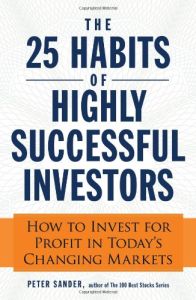Únase a getAbstract para acceder al resumen.

Únase a getAbstract para acceder al resumen.
Peter Sander
The 25 Habits of Highly Successful Investors
How to Invest for Profit in Today’s Changing Markets
Platinum Press, 2013
¿De qué se trata?
This excellent investment primer begins by showing you how to develop consistent habits that foster profitability.
Recommendation
Developing sound investment habits increases your odds of making profitable decisions. Financial writer Peter Sander focuses on the sound habits involved in “value investing.” While learning and applying good investing habits take practice, Sander offers a helpful guide for beginning investors who need a framework for navigating today’s complex investments. Sander distills core value-investing ideas and analytical methods into focused applications – habits – any beginner can apply. While never giving investment advice, getAbstract recommends this easy-to-understand primer to novice investors seeking a lucid introduction to value investing.
Summary
About the Author
Peter Sander’s books on investing and personal finance include the 100 Best Stocks series, Value Investing for Dummies and 101 Things Everyone Should Know About Economics.

















Comment on this summary